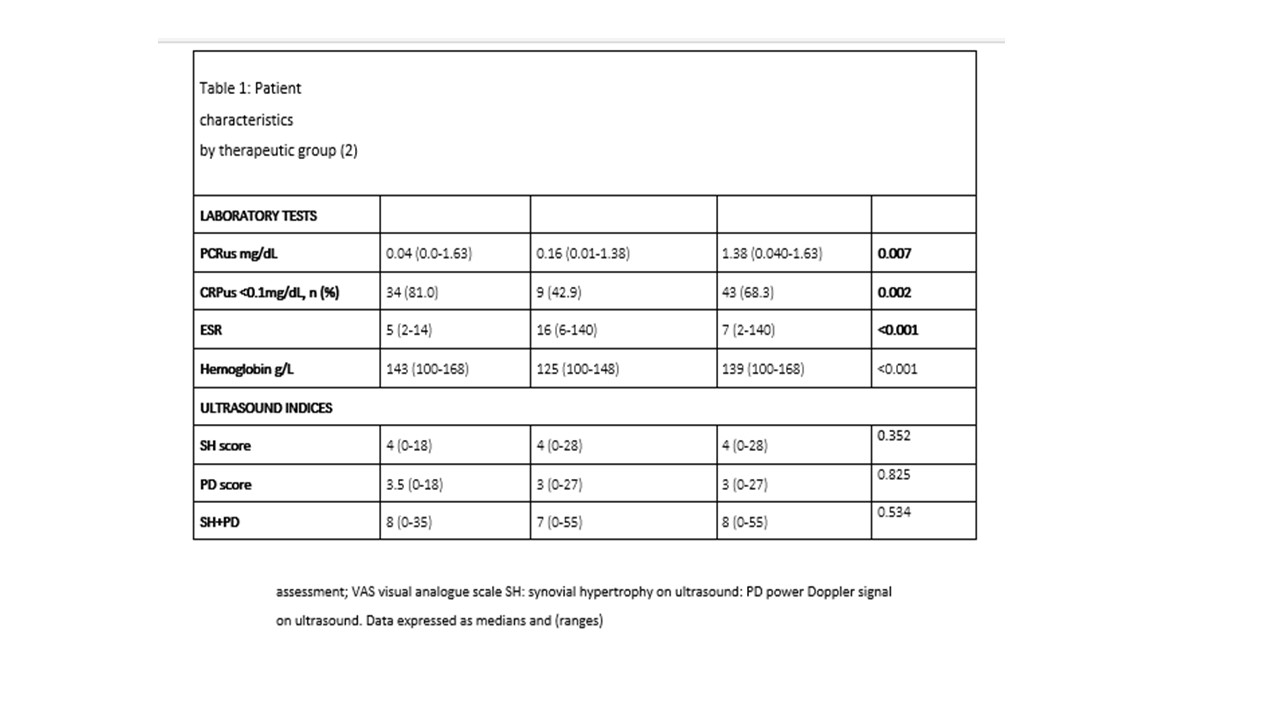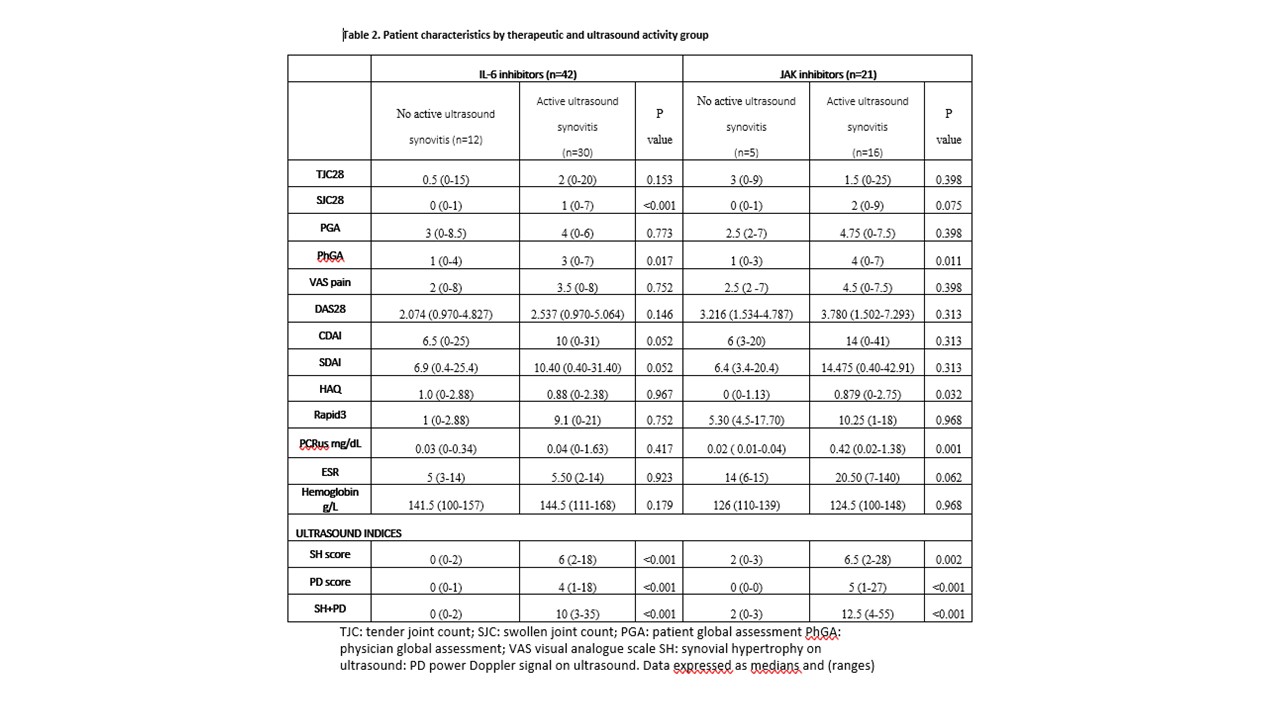Session Information
Date: Monday, November 8, 2021
Session Type: Poster Session C
Session Time: 8:30AM-10:30AM
Background/Purpose: IL6 inhibitors (IL6i) have a dramatic effect on the reduction of C reactive protein (CRP) that does not always correlate with a significant improvement in synovial inflammation in rheumatoid arthritis (RA). Measurement of inflammatory activity with composite articular indices including acute phase reactants (APR) in RA patients treated with IL6i is considered inadequate. Since Jak inhibitors (Jaki) also affect IL6 activity, the performance of these indices in correctly assessing disease activity has been questioned. Joint ultrasound is not included in the composite indices used in RA but is widely used in clinical practice and has a greater sensitivity than clinical exam in detecting active synovitis.
To compare inflammatory activity measured by joint ultrasound with the composite disease activity indices and APR in patients with RA treated with IL6i or Jaki.
Methods: Observational, cross-sectional study in consecutive RA patients (ACR/EULAR 2010) treated with IL6i (tocilizumab, sarilumab) or Jaki (tofacitinib, baricitinib). We evaluated demographic and serologic (autoantibodies, ESR, ultrasensitive (us) CRP) data, composite disease activity indices (DAS28, SDAI, CDAI, RAPID3), HAQ and therapies. Joint ultrasound of both hands was evaluated and graded according to Szudlarek’s(1). A synovial hypertrophy (SH) score, power Doppler ultrasound (PDUS) and a total score (SH+PDUS) was obtained. A definition of active synovitis developed was considered (SH ≥ 2 plus PD ≥1)(2). We compared the variables between IL6i and Jaki patients. Spearman`s correlation test was used to correlate ultrasound scores and clinical and laboratory parameters.
Results: We included 63 patients (92.1% female, median age 58.6 years, median disease duration 14.4 years, 93% seropositive (RF and/or ACPA). 42 patients were treated with IL6i and 21 with Jaki. Therapy duration was significantly lower in Jaki patients. No significant differences were observed in activity indices, although DAS28 was higher in Jaki patients. No significant between-group differences were observed in ultrasound scores [Table 1].
Active ultrasound synovitis (AUS) (SH ≥ 2 plus PD ≥ 1) in ≥ 1 joint was achieved by 30 IL6i patients and 16 Jaki patients (71% vs. 76% respectively). IL6i patients with AUS had a higher SJC and PhGA score than those without. Jaki patients with AUS had higher SJC, PhGA and usCRP (Table 2).
In IL6i patients, the total ultrasound score significantly correlated only with the SJC28 (r=0.605; p< 0.001) and PhGA (r=0.392; p=0.011), although the CDAI showed a non-significant trend (r=0.279 p=0.07), which was significant when evaluating the PD score (r=0.320; p=0.039). The total ultrasound score in Jaki patients significantly correlated with SJC28(r=0.777; p=0.000), PhGA (r=0.728; p=0.000), usCRP (r=0.533; p=0.013) ESR (r=0.692; p=0.001), CDAI (r=0.536; p=0.012), SDAI (r=0.538; p=0.012) and DAS28 (r=0.568; p=0.007).
Conclusion: The composite activity index and APR reflect the inflammatory status, evaluated by ultrasound in RA patients treated with Jakinibs but not in those treated with IL6i.
1. Arthritis Rheum 2003;48:995-62.
2. Arthritis Res Ther 2016,18-160.
To cite this abstract in AMA style:
Ponce A, Frade-Sosa B, Julio R, Sapena N, Gumucio R, Ruiz-Esquide V, Morlà R, Bassas M, Cañete J, Gomez-Puerta J. Composite Articular Index Including Acute Phase Reactants Should Not Be Used in Patients with Rheumatoid Arthritis Treated with Il6 Inhibitors but May Be Useful in Those Receiving Jak Inhibitors: Ultrasound Evidence [abstract]. Arthritis Rheumatol. 2021; 73 (suppl 9). https://acrabstracts.org/abstract/composite-articular-index-including-acute-phase-reactants-should-not-be-used-in-patients-with-rheumatoid-arthritis-treated-with-il6-inhibitors-but-may-be-useful-in-those-receiving-jak-inhibitors-ultr/. Accessed .« Back to ACR Convergence 2021
ACR Meeting Abstracts - https://acrabstracts.org/abstract/composite-articular-index-including-acute-phase-reactants-should-not-be-used-in-patients-with-rheumatoid-arthritis-treated-with-il6-inhibitors-but-may-be-useful-in-those-receiving-jak-inhibitors-ultr/



